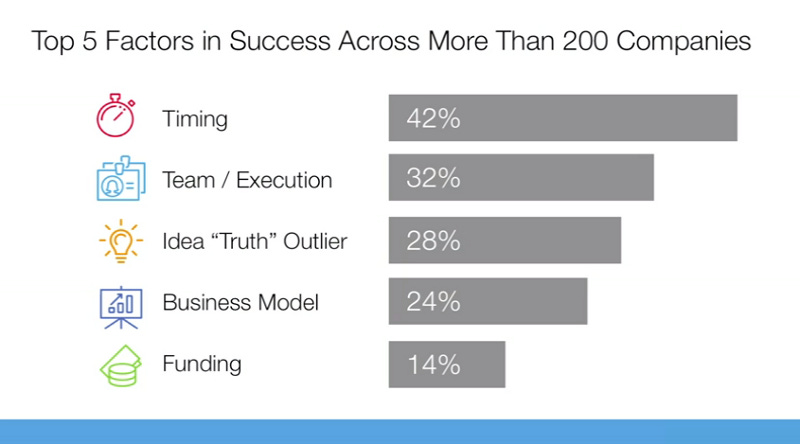Timing is everything
When we launch a startup is key to its success. I break down what being early, on time and late looks like
Ideas that help marketers do better and be better. Subscribe here. Check out my other essays on marketing here.
A guy I knew once chose his spouse by scoring her against other ‘candidates’ on a list of parameters. 30+ years later, they are happily married, and still going strong.
Who we marry has an outsized influence on our life outcomes. But just as we can’t be 100% confident of our choice of life partner, we can’t always tell a good start up idea from a bad one when we first hear it.
So how do we predict which start up will succeed?
Bill Gross asked the same question. He studied 200 startups and concluded that timing of launch influenced success the most. It beats other factors we mistakenly think value more - team, quality of execution, funding, business model. even the idea itself!

Watch Bill’s short (only 6:31min) Ted talk here.
Even if timing of launch influences success, we still need to navigate the agonising decision of when to launch.
I explore how to navigate being early, on time and late.
1. Being early is the same as being wrong
In life and in business, timing is everything. Many startups failed because they entered a market too early. Especially those that are tech innovators. Any new technology-based idea does not succeed in isolation. It needs an ecosystem of supporting technologies to help make it work.
Virtual assistants (Alexa), streaming services (Twitch, Netflix), ride-sharing (Lyft, Uber) and wearables (AirPods) are untenable without tech such as low-latency voice recognition, smartphones, Bluetooth, and sensors, respectively.
NFX (Venture Capital Firm)
Pre-existing technologies make the path easier because they have already primed consumers to build habits around the tech. They have also built supply side economics of the market.
Examples:
The electric car motor was invented by Nikola Tesla in 1888. However, since the car industry had already invested heavily into petrol-powered engines, the power brokers did not support adoption of electric engines.
Interactive Web TV was invented in 1983 by Microsoft. But consumers were not ready to get their heads around this invention because they were only just getting used to computers. So for them, the TV and the computer were two mutually exclusive products. 40 years later, the tech ecosystem of internet, touchscreen, on-demand content streaming broke barriers to adoption of connected TV.
Handheld tablets came into the market in 1987, as Apple Newton. But the clunky handwriting technology made the product difficult to use. It was only when touchscreen technology became stable, that iphone and ipad became wildly successful.
Digital payments - UPI in India. Oftentimes, unforseen circumstances create a perfect storm to make inventions mainstream. Multiple moving parts of demonetisation, covid, Reliance Jio’s affordable phones+data catapulted digital payments in India.
When YouTube hit the market, cell phone bandwidth and internet speed was already fast, making YouTube experience delightful.
Uber succeeded because GPS and internet speed made real-time tracking of cars and people easy.
2. Being on time is the same as being late
We all think alike and move in herds. That’s why we battle scarcity around great ideas. We all queued up for Harry Potter, the latest iphone, and all good IPOs are over subscribed. By the time we complete our homework on an idea, we see that someone else has already entered the market. That’s why, the minute we get an idea, it is important to stay paranoid and prioritize speed over perfection.
As Reid Hoffman has famously said, “If you are not embarrassed by the first version of your product, you’ve launched too late”.
This is the equivalent of meeting your future spouse as often as possible (to test compatability) before saying ‘I Do’.
Important at this stage to not be rigid about the original idea, but to be ok with changing it to suit the market. Like my professors at Stanford D-School used to say, “strong opinions, but loosely held”.
Examples: there are a million examples of new ideas that started as one thing, but then completely changed along the way. They all took forward parts that worked, and dropped parts that didn’t.
Youtube started as a dating site, where people could upload their videos for potential dates. They dropped the dating part, but retained the video uploading and discoverability algorithm.
Coca Cola started as a digestive beverage. It kept the formula, and changed the marketing story.
Shopify launched as an online store to sell snowboarding gear. The product did not sell, but the software to build the storefront was powerful, and that is what the founders decided to launch as a service.
Ola and Flipkart looked at the success of Uber and Amazon in other markets and gained first mover advantage in India. If there are successful companies in other countries, it is a strong signal that you are on the right track.
3. If you are late, then differentiate
While the preferred option is to get out there and start pivoting your idea, sometimes there is merit in being second or third mover too. Remember, competition is good for two reasons. One, they grow the market and create a category (hopefully, a big enough category for multiple players). Two, the first mover gives you a counter point - a business model to improve, or an idea to differentiate against.
So if you are late, all is not lost, provided you differentiate.
Examples: there are millions of examples of new ideas that were not first to market, but have built substantial businesses nevertheless.
Create a new business model. Mattress was a 100% offline category. Casper built a $1BN D2C brand through better business model economics and differentiation for the consumer.
Do it better. AskJeeves was the first search engine. Google came along and had a better search algorithm. Six Degrees was the first social media platform. Facebook came along just a year later and had a more addictive product.
Find a niche. Shopify helps small retailers build their shopfront and start an online business. This is a small but valuable niche in the mammoth retail market.
Disrupt. Red Bull is everything that Cola isn’t. It is an acquired taste, expensive, and gives you a buzz.
Build on behaviors first movers have seeded. Facebook primed consumers to share their lives online. Instagram leveraged this and built the selfie culture. Then Tik Tok came along with their endless personalised algorithm and turned everyone into performers in search of fame.
Oftentimes we don’t enter a market because we feel like a ‘me too’. What we forget is that every company, every founder and every business system does something better than anybody else.
Rory Sutherland, is very practical when he says, “…to succeed in business, you don’t have to be right – you simply have to be less dumb than your competitors.” Find out what you can do different or better than the first mover and do it.
Having said all that, let us not forget-
Good ideas are not born, they are made.
Ideas are not born fully formed. The strength of an idea helps, but does not guarantee success. Making an idea successful needs hard work and consistent execution daily. Just like a marriage.
Glint in eyes.
After everything is said and done, ‘glint in the eye’ beats hard cold logic. When we share our idea with a potential customer or investor, if her eyes light up, we know we are onto a good thing.
Most delicious honey copy
By the way, this is the most delicious writing I have read in a long time. It’s written by Cole Schafer, he calls himself an Advertising Man…it’s so finger lickin’ good that this is the only newsletter I read the minute it lands into my mail box. Even after I finish reading it, I still want more. Check it our here - Sticky Notes.








Timing is everything. Really loved the writing of Cole Schafer, thanks for the reco!